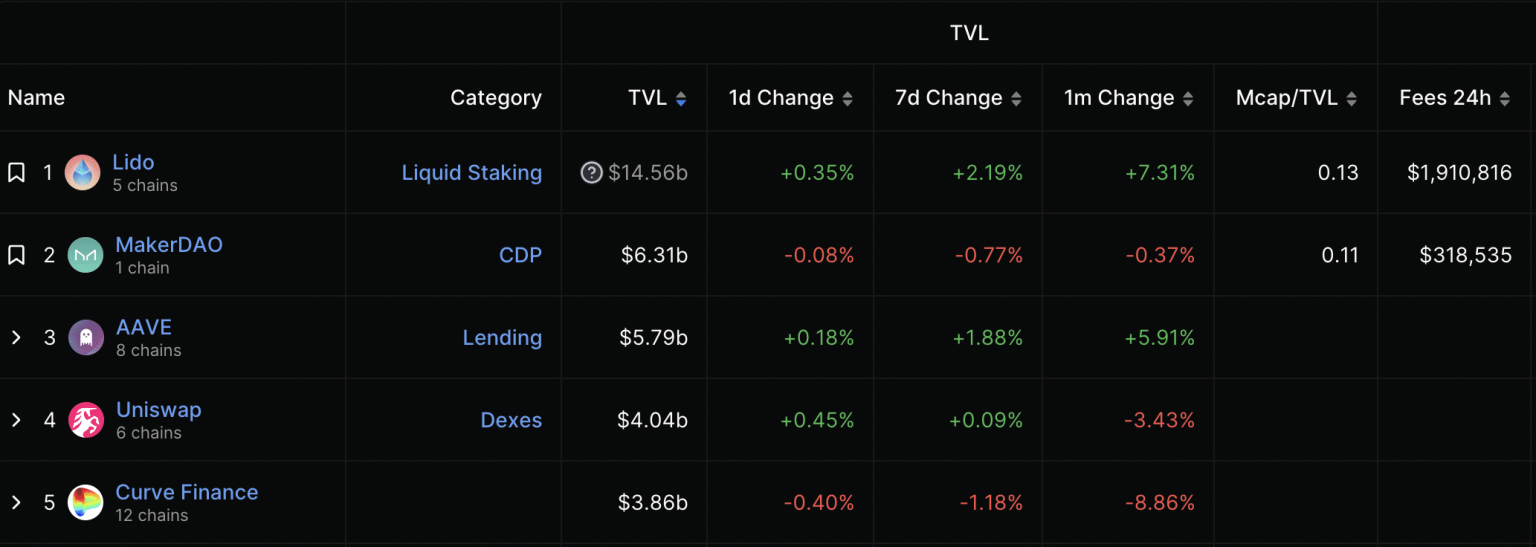- Within six months, Lido’s TVL has doubled that of MakerDao.
- DAI’s supply has trended downwards since the temporary depeg in March.
According to data from DefiLlama, Lido [LDO] currently holds a 32% share of the entire decentralized finance’s (DeFi) total value locked (TVL). Lido’s TVL has almost doubled when compared to that of the previous DeFi king MakerDAO [MKR]. This happened within just six months of Lido taking over the top position from Maker.
Read Lido Finance’s [LDO] Price Prediction 2023-2024
Per data from the DeFi data provider, the TVL of the liquid staking protocol was $14.57 billion at the time of writing. This year alone, Lido’s TVL has gone up by 148%.

Source: DefiLlama
A turbulent year for Maker
Maker was replaced by Lido as the leading DeFi protocol at the beginning of the year as increased Ether (ETH) staking activity in expectation of Ethereum’s Shanghai Upgrade drove traffic to the liquid staking protocol.
Between January and when Shanghai went live on 12 April, the total value of ETH staked on Lido rallied by 22%. Per Dune Analytics, Lido’s share of the ETH staking ecosystem also grew to levels last seen in May 2022.

Source: Dune Analytics
While many anticipated a decline in Lido’s market share following Shanghai, the opposite has been the case. Since the hardfork upgrade on 12 May, the total value of ETH staked on Lido has climbed by 33%, data from Glassnode showed.

Source: Glassnode
Further, the growth in Ether staking on the protocol rallied despite the persistent drop in ETH staking APR offered by Lido. At press time, this stood at 3.87%, dropping by 38% since 12 April.
Is your portfolio green? Check the Lido Finance Profit Calculator
Things went downhill after the depeg
Maker, on the other hand, continued to record a hit to its TVL since the year began. The situation worsened when DAI suffered a depeg in March due to the unexpected collapse of Silicon Valley Bank, which resulted in USDC temporarily losing its parity to the dollar.
While DAI has regained its peg, its supply has since dropped. At 4.65 billion at the time of writing, DAI’s supply declined by 12% in Q2, per data from Maker Burn.

Source: Maker Burn
When DAI supply drops, there are fewer DAI tokens in circulation, which could result in a decline in demand.
A decline in DAI demand means that there is less demand for borrowing the stablecoin, which in turn affects Maker’s TVL. This means there has been a decrease in the amount of collateral locked in Maker’s smart contracts, causing its TVL to experience stunted growth.

